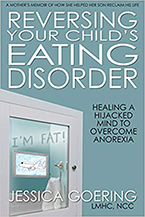Article first published as Book Review: 'Reversing Your Child’s Eating Disorder' by Jessica Goering on Blogcritics.
November 29, 2018
Reversing Your Child’s Eating Disorder:
Healing aHijackedMind to Overcome Anorexia
Jessica Goering
Aviva Publishing (2018)
ISBN: 9781940984445
New Book Details Mom’s Fight to Save Anorexic Teenage Son’s Life
 Jessica Goering has gone through one of a parent’s worst nightmares and lived to tell the tale. Fortunately, her son also lived, but there were moments during his journey through anorexia that made future possibilities so frightening that as I read about them, they sent shivers down my spine.
Jessica Goering has gone through one of a parent’s worst nightmares and lived to tell the tale. Fortunately, her son also lived, but there were moments during his journey through anorexia that made future possibilities so frightening that as I read about them, they sent shivers down my spine.
Most children who experience anorexia are girls, so to have her thirteen-year-old son suddenly decide he was fat and refuse to eat was the last thing Jessica expected. Almost as bad was that his anorexia began while he was away for the summer visiting his father. When Jessica learned about his eating disorder, she flew to get him and was overwhelmed by the sight of how severely malnourished he had become in just a couple of months. Although horrified, she knew she could not limit her focus to just the exterior disarray she saw but instead needed to focus on reversing the situation and finding ways to get her son to eat and change his internal way of thinking about his body.
I won’t go into all the details of how Jessica spent a year turning around this situation. If it’s true, though, that it takes a village to raise a child, it’s even more true when it comes to helping a child reverse an eating disorder. Jessica enlisted the help of her younger son, of friends, of teachers and school counselors, psychiatrists, nutritionists, and doctors. In some cases, she found that the people she thought were trying to help really did not help, especially when it came to the medical professions. She also had to make difficult choices about whom she told about the condition and whom she kept it from. For example, when her son was invited to another child’s party, which of course would include food he was adverse to eating, should she tell the parents of the other child ahead of time about her son’s anorexia? These difficult judgment calls became a major part of Jessica’s life.
Even more, she was caught up in trying to understand and predict her son’s behavior. Her son continually claimed that he was too fat and disgusting. He had delusional ideas about the size of his body and feared hurting people and animals because of how supposedly large he was—when he was really an emaciated thirteen-year-old boy. Most terrifying of all was when he interacted with other children and suddenly his behavior became irrational. While he was only violent toward himself, at one point he began howling and climbed a tree, which frightened other children he was with. His body and brain were not getting the nourishment needed to sustain them so that his growth became stunted and it was almost like he was moving backwards in his intelligence and understanding. Jessica seriously began to fear that he would retard his development long-term.
Fortunately, through all her efforts, Jessica was able to help her son return to living a normal life, and today he is a happy and healthy teenage boy. She has written this book not only to document what happened and to share the story, but to give hope to other parents and people who have a loved one suffering from an eating disorder. She offers plenty of advice, a great deal of hope, and some eye-opening explanations for how to cope with these difficult situations as well as for understanding and predicting what will set off such behaviors.
Each chapter in the book ends with a helpful tip. For example, many parents might be obsessed with weighing their child to make sure he or she is gaining weight, but such a practice is detrimental to the child who would be horrified by weight gain, believing he or she is already too fat. Jessica’s tip is: “Blind weigh-ins are important. Avoid the scale and measuring tape unless used by a health professional and keep the information away from the child. Do not allow the child to fixate on a number or other comparative means. Prevent this as much as possible.”
Jessica also makes clear how vital it is for parents to understand that when dealing with an eating disorder, they are not dealing with their usual child whom they know and love, but a child who has had his or her brain taken over by the disorder. To make this clear, throughout the book, Jessica refers to anorexia as Terrorist Joey. From what she describes, it really did feel like a terrorist had taken over her home and was holding all her family hostage. Rational thinking cannot be expected from the child as a result of this terrorist takeover, whether it be in terms of eating, being weighed, or countless other behaviors.
Fortunately, Jessica was able to save her child. And fortunately for all of us, she has written this book to help others to do the same for their loved ones. Not only will people receive a better understanding of anorexia and eating disorders in these pages, but they will find hope and compassion for a disorder we must all fight together.
For more information about Reversing Your Child’s Eating Disorder and Jessica Goering, visit www.ReversingYourChildsEatingDisorder.com. [Link disabled becasue URL did not work when this review was posted.]
— Tyler R. Tichelaar, Ph.D. and award-winning author of The Best Place and Arthur’s Legacy

